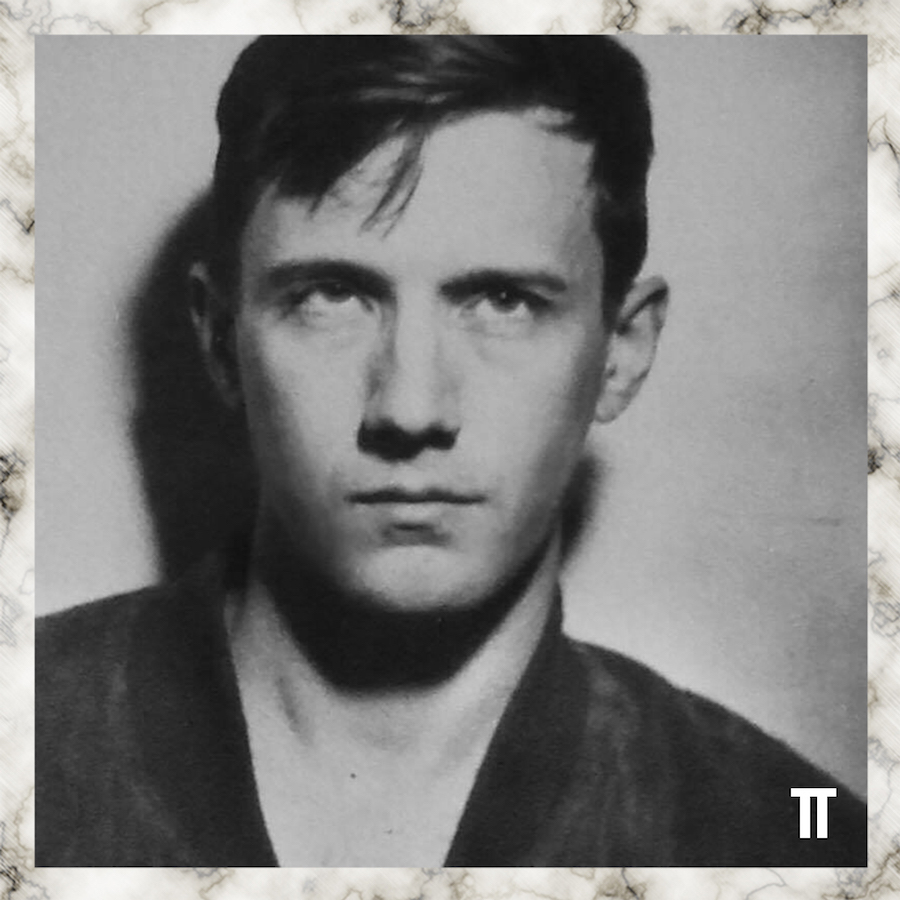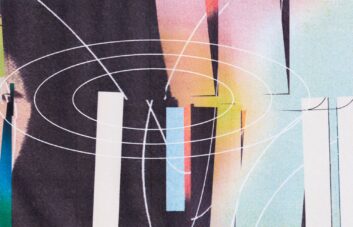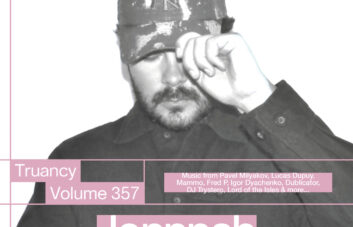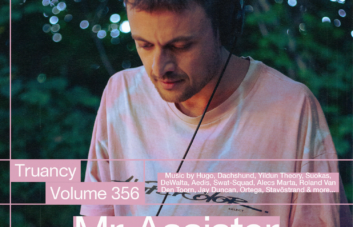It’s hard to know where to begin when introducing Daniel Martin-McCormick. For the past number of years he’s been producing mind-bending techno as Ital, appearing on labels such as Planet Mu, 100% Silk, Workshop and Gang Of Ducks. He’s teamed up with Aurora Halal for a pair of 12″s on his Lovers Rock label. He’s also a part of Sleeper Cell with Earthen Sea, releasing foggy electronica that blurs the line between techno and ambient (whatever that word means these days) and jammed out with Jamal Moss as Interplanetary Prophets. This isn’t even counting his earlier days in bands Black Eyes and Mi Ami. Right now though, he’s focusing on a new alias, Relaxer, and last year released three 12″s under that name. He’s given us a spectacular mix, and he answered our questions with great insight and clarity.
Both the Relaxer tracks and the stuff you do with Aurora as Ital & Halal seems to inhabit a very particular strand of techno that’s both dubby and lucid. Does that seem like an apt description? “Yea, that sounds about right. When I’m writing I can’t get into making a track unless I have a sense of the atmosphere all the parts are moving through. The dub pioneers were of course masters at bringing out a very haunting sense of space in their mixes, where the delay really makes the tracks feel emptier and more shadowy.”
It seems more focused than early Silk releases, which you said “conveyed the excitement I felt hijacking this genre” in an interview with Juno Plus. Where do your current influences come from? “My environment is a huge influence. When I first started making tracks I was working in isolation and listening to 12”s like normal songs, out of context from any club environment. Now playing almost exclusively in traditional club scenarios, I’m experiencing no small amount of revulsion at the homogenisation of techno. Not to sound like a crank.. I’m just always having to check in with myself, because there are so many easy answers. I’m seeing how easily people can lose their personality in being slamming, big room DJs, and get subsumed by these systems that might not reflect their true selves. It pushes me to ask myself fundamental questions about who I really am and what I want to get out of performance, production, etc. It’s something I love doing, but I think if you’re not keeping that conversation going you can get lost in the sauce, so to speak.
Otherwise, just life. I keep going back to a couple artists and studying their work almost religiously. But it’s not to copy, more to just try and understand or to get inspired. People like DJ Sprinkles and Vladislav Delay, I just keep going back over and over again.”
Have you moved away from the use of samples? Or at least the obvious ones (Gaga, Beyoncé etc). It’s often hard to tell if you’ve used any! “Right before I left for my most recent tour I was putting the finishing touches on my live set and did a recording of the whole thing to listen back. I didn’t realize how many samples were in there, especially from films. There’s a lot of scenes of men trying to break in, or women being chased down the street. Some stuff, like the Jamie Lee Curtis scene from Halloween which I included in this podcast, I used because I remembered it specifically from my youth. I was in the car with my mom when I was 10 years old, it was right before Halloween, and NPR played this clip on the radio. I remember thinking it was the craziest, most petrifying thing I had ever heard and was completely transfixed. I decided to use it because I remembered how much power it had, and I wanted people to be thinking about toxic masculinity, violence against women and our current political climate. All that stuff is in there anyways, informing the emotions of my music, so why not put it in? It becomes this overwhelming but also cathartic moment.
I also used this interview with a schizophrenic woman that hit home more than I would have liked to admit. There’s a desperation in her voice and words that’s very hard to listen to, but I figured probably lots of people are struggling with various forms of depression, and there have been times when a DJ took it there and I really connected. When I was prepping the set I played it for a couple friends. The responses were evenly split between “take it out and let people party, it’s too stressful” and “turn it up, it’s the best part.” I went with the second opinion.”
You’ve mentioned certain modes of production – DX200, Effectron II, MPC1000, Audacity – what are you using at present? Have you added anything particularly noteworthy to your studio? “This may sound flippant but the best studio hack in recent memory has been keeping a journal. Lighting can be very helpful too – I got an LED light that slowly fades between different colors and it really helps to set the mood.”
Thanks for the mix you’ve done for us, it’s a really intense experience. In another JP piece you said: “Since I first started DJing I’ve been fascinated with long mixes. Something about one track gradually dawning over another draws me in more than raw and dirty quick cuts.” This mix very much feels in that vein – it feels like a single mood carries through but almost unravels and opens up in the final tracks – initially the track around 54 mins changes the mood, from nightmare techno to screaming house, and the Shake track a few minutes later takes that home. It’s almost like you’ve been dancing in the dark for ages and all of a sudden a window opens and you realise it’s morning. Can you tell us about how you put it together? “Yea, I don’t have much to add to that, you nailed it. I put it together just DJing in the living room with two CDJs and a turntable. Later on I added a couple sounds and beatless pieces. But I’ve realized recently how little I consider myself a DJ. When I think of true DJs I think of people who are turned on by the entire craft of DJing and who are really focused on rocking a party. I love doing it, but for me, being a DJ is another way of performing, and I learned to perform playing punk shows. The reason punk was appealing is you’re supposed to be confrontational. It’s fun too, of course, but it’s raw and visceral. So when I think of a successful performance, it’s coming from that perspective of going for the jugular.” Did you have an audience? “Yes, Aurora and my roommate were making dinner and egging me on.”
“What’s your most favourite part about heaven?” as the vocal sample asks at the end of the mix. “I thought this clip was just really creepy and also sad, a dying kid describing heaven while his parents post it on YouTube. There’s so much evangelical terror in America right now.”
I was really taken aback by the inspiration behind your Boiler Room mix last year – “It’s an uneasy relief; you can’t help but wonder where the people went, if any suffering was alleviated, or if they were just pushed out of the way and are suffering somewhere else.” How do you feel techno and electronic music sits within the community? Is there more we could be doing? ‘What’s “the community?’ Depending on who you ask, techno and electronic music in NY are either colonizing forces of gentrification or outlaws in a war against the arts. Techno can be a vacant soundtrack to drug consumption or a means of articulating possible alternate realities and a space of radical inclusion. One reason I fell in love with techno and raves/parties is that they can feel like a dream, at its best a revelatory dream that the audience dreams together. If artists have any responsibility, it might be to make their art as true to their deepest, most hidden self, as possible. From there, political action or community action can be taken as needed.”
I’ve listened to the live version of “Phase 2” so many times – what’s your approach to live performances? “I imagine the live set not unlike a film, with acts. Basically I have certain songs I want to get to, and I try to grab the energy in the room right away with the first track. In between there are groupings of songs that escalate the drama and push things into weird directions before pulling you out at the end. I leave room to maneuver within the songs but it’s always a journey I’ve arranged in full. I used to end my sets by going into the craziest noise blast I could and then turning off the mixer, just dropping the audience off a cliff. But the more I develop the narrative of the set the more I want to give people a landing.”
Relaxer was the name of the opening track on Endgame, and now it’s your chosen artist name (for the moment anyway). What led you to take this name? “At some point in 2014 I saw the word “relaxer” and imagined a very specific image of a patient tied to a bed in a hospital being administered a tranquilizer with a gun-like apparatus. I was thinking a lot about the general state of the world and just noticing there was this weird trend that every product being sold to my generation was soundtracked with some insipid ukelele-and-whistling music. It created this unsettling ambient cultural narrative that we were all sensible cool millennials doing just fine living in some kind of post-Mumford & Sons, farm-to-table Brooklyn utopia. Obviously this is not true. Just little things, like fake wood panelling on apps or whatever seemed to point to a much larger culture of avoidance. We’re happy to buy into narratives that things are normal, classic and appropriate when that’s really a mirage and everything from the condition of the planet to the job market to gun laws to, now, our president just points to a rotting society. And I’m not trying to exempt myself, by the way. But anything which this system produces which would allow you to relax is probably, in this sense, a relaxer – a self-administered weapon that keeps people thinking within very flawed and self-destructive parameters.”
You recently debuted the Relaxer live show at Berghain. How did that go? What a place to kick off the live incarnation. “It was great. The sound is of course phenomenal, so playing a live set there was just so satisfying on that visceral level. The energy in that room is on another level, people come into that place with a lot of anticipation and excitement, which makes the sets feel more definitive. I embraced that and worked a lot in advance to boil down the set to its bare essentials.”
I love the line in your interview with Rrose: “I feel like there is a lot of ambient techno or what’s referred to as ambient but might not be ambient at all, just beatless music that’s rooted in techno that overlaps a lot in sonic ways with modern composition or 20th century music. But the social atmosphere or the way it’s released and the expectations lead people to hear it in different ways.” There’s also a line in a recent Anthony Child interview: “The term ‘ambient’ though? I try to stop myself when I use it. I relate to the term ‘ambient’ to the Eno sense – music which is made to be background music – and I think he referred to it almost as being akin to a scent or a perfume. It’s not music to focus on or pay attention to; which is a totally valid concept, but I have a problem with the label. Just because something doesn’t have drums in it, it tends to get the ambient tag.” How do you think your music fits into that category, or would you give it another term? Especially stuff like the beatless Sleeper Cell tracks, for example. “That Anthony Child quote is great, he really nails it. When I make a track with no drums, it’s because I like a lot of music without drums. When you take away the drums, the synths seem to just float in the air, which can be quite beautiful. The interesting thing is that if ambient music is supposed to be background perfume, something to get lost in or ignore… well isn’t that how most DJ nights are structured? Techno’s shirking of performance, vocals, its unchanging pulse and avoidance of sudden changes, tempo shifts or jarring juxtapositions is incredibly ambient. Ditto for the take-it-or-leave-it quality of the DJ set as an institution. It’s just there, going, the whole time you’re at the party. If we’re in Europe it might be going long after you leave, and would have started hours before you even left the house.”
What’s in store for Lovers Rock? “There’s a bunch of stuff about to get sent off to be mastered. I just sent in the next Relaxer EP, and there’s an Ital EP coming. Damon Eliza Palermo has a beatless, dare-I-say ambient EP coming. There’s other stuff almost ready for confirmation too.”
Earthen Sea recently released a beautiful album on Kranky, which seemed like a big move for him. What does that mean for him as regards your label? “We have talked about working on a couple different things but he’s taking his time writing new material and playing some shows. There will always be a home for Earthen Sea on LR.”
What’s your surefire method of relaxing? “I don’t have one, much to my dismay.”
Relaxer: Soundcloud, Bandcamp




